This post may contain affiliate links. See our affiliate disclaimer here.
RVing in Canada allows you to take an exotic, international vacation without the hassle of airports. My husband and I have traveled to Canada in our RV multiple times and visited some amazing places. However, driving into Canada from the U.S. requires advanced thought and planning.
Below is a complete guide on traveling from the United States to Canada in an RV.
Contents
Crossing the Border into Canada
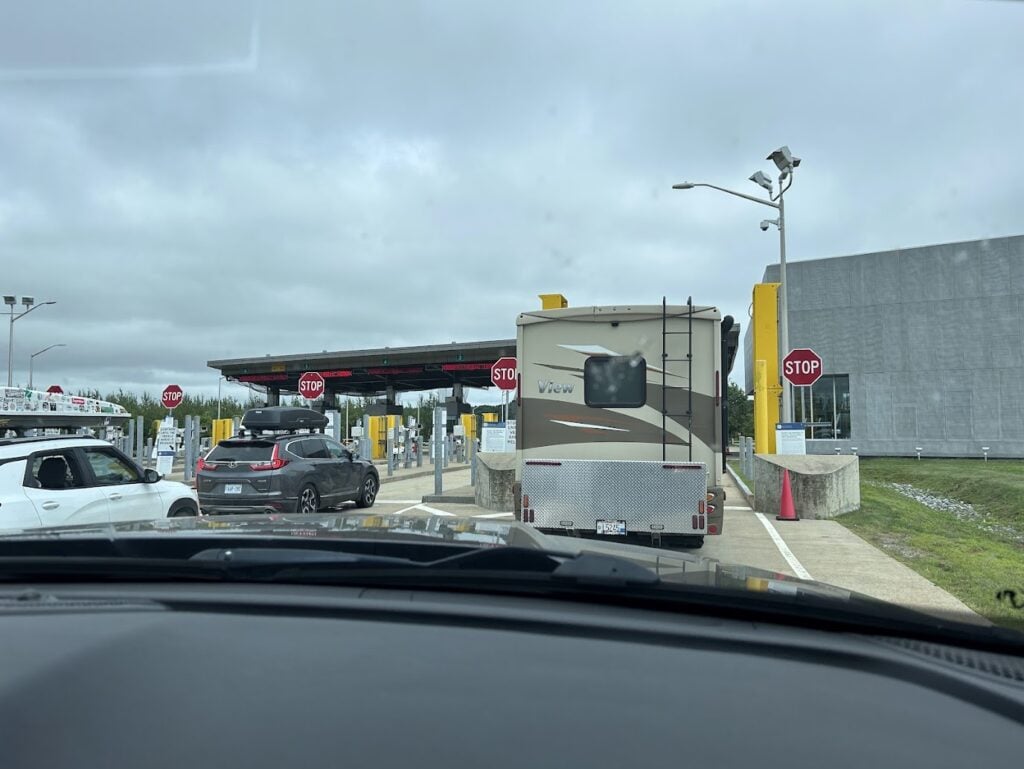
Prohibited Items
In preparation for your border crossing, you must learn what items are prohibited or restricted. It is important to double-check the official Canada Border Services website to ensure you understand current guidelines.
Remove the following prohibited or regulated items from your RV before driving to Canada:
- Meat, Animal Products, and Fresh Produce*
- Plants
- Firewood
- Firearms, weapons, and fireworks
- Alcohol (no more than a case of beer or 2 bottles of wine)
- Tobacco products (no more than a carton of cigarettes)
- Cannabis (transporting across the border is a criminal offense)
*Note on food: Travelers may be allowed to bring some meat and produce for personal use, but there are several limitations and requirements (i.e. most meat must say “Product of the U.S.A” on the package). We find it easier to travel across the border without these types of food instead of checking each product against current regulations.
Required Documents
Before attempting to cross the border, have all your documents in order. Each person in your RV will need a passport, passport card, OR NEXUS card.
You also need the registration or title document for each vehicle, including your RV.
Documentation for Pets
Bringing your cat or dog on your Canadian adventure will be a breeze as long as you have the proper paperwork. For each pet, always carry proof of a current rabies vaccination.
If you are traveling with a dog, there are more stringent requirements to re-enter the United States. Effective August 1st, 2024 dogs entering (or re-entering) the United States must:
- Be at least 6 months old
- Have a scannable microchip
- Have a CDC Dog Import Form (completed online 2 to 10 days before your border crossing back into the US)
- Have a Proof of Rabies Vaccine
Additional documentation will be required if your dog has recently visited a country with a high rabies risk. Check the CDC website for current requirements.
Crossing the Border
Once you have all your documents and clear your RV of prohibited items, you are ready to drive your RV into Canada. There are often long waits at border crossings, so avoid crossing at peak times, such as rush hour or long weekends.
You can view current wait times on the Canada Border Services Agency’s website. Finally, remember to be patient and answer all the border patrol’s questions honestly. If you have prepared properly, you are likely to breeze through the border.
Driving and Fuel Stations while RVing in Canada
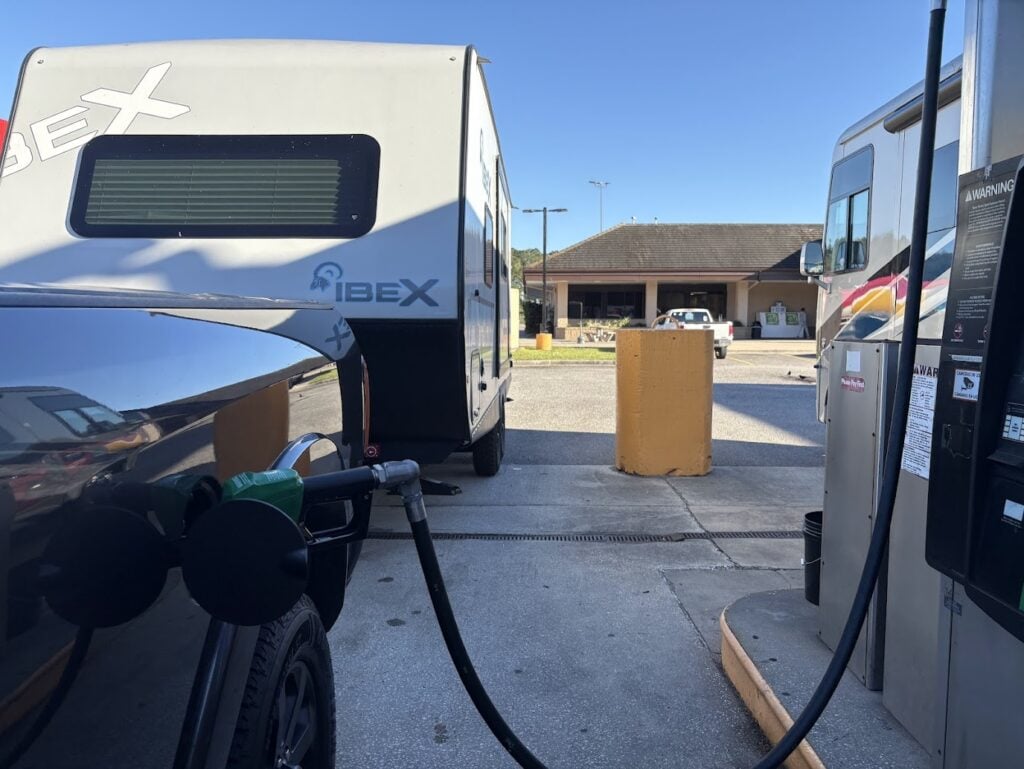
RVing in Canada is very similar to driving in the United States. Canadians also drive on the right side of the road and traffic laws are similar.
However, speed limits are posted in kilometers per hour, so you will need to be able to calculate the conversion to avoid a speeding ticket. 1 kilometer is equal to 0.62 miles, so a 100 km per hour speed limit is 62 miles per hour.
You will also need math skills to calculate the price of fuel while RVing in Canada. Fuel prices in Canada are posted in price per liter.
To convert the price per liter to a price per U.S. gallon simply multiply by 3.76. Then, multiply by the current exchange rate to calculate the price in U.S. dollars. If gas is posted as 1.50 per liter, it would be 5.64 Canadian dollars per gallon. Then, based on the current exchange rate of 0.73, the price would be 4.12 U.S. dollars per gallon.
If you have a diesel RV, know that diesel pump handles are not green. We learned the hard way that gas pumps may be green in Canada and pumped a few gallons of gasoline in our diesel engine. Pay careful attention to the signs before pumping any fuel into your RV or tow vehicle.
Finding a Campsite while RVing in Canada
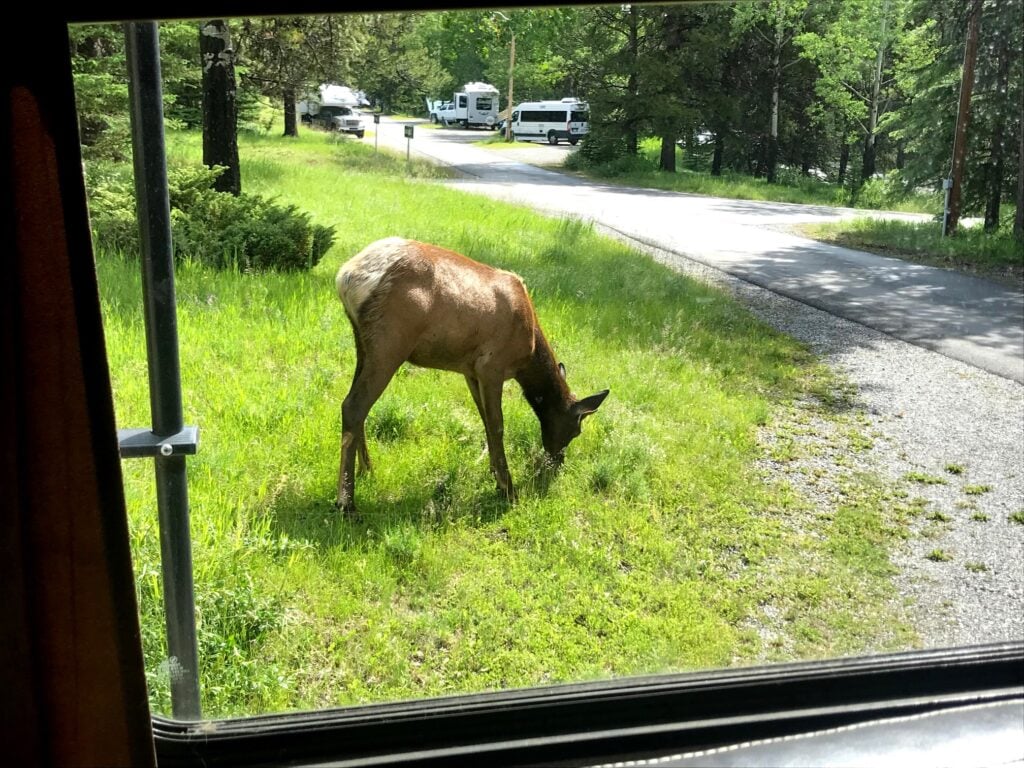
You can use many of the same resources to find campsites while RVing in Canada as you would in the U.S. If you want to stay in a provincial or national park, you will need to make a reservation through government websites.
Each province has its own system for provincial park camping reservations. National park campsites can be booked through the Parks Canada website.
If you want to camp within a popular national park, such as Banff, you need to make a reservation months in advance. Reservations for the year, open in January and vary for each national park. If possible, book your campsite the day reservations open in January.
Cell Phones and Internet
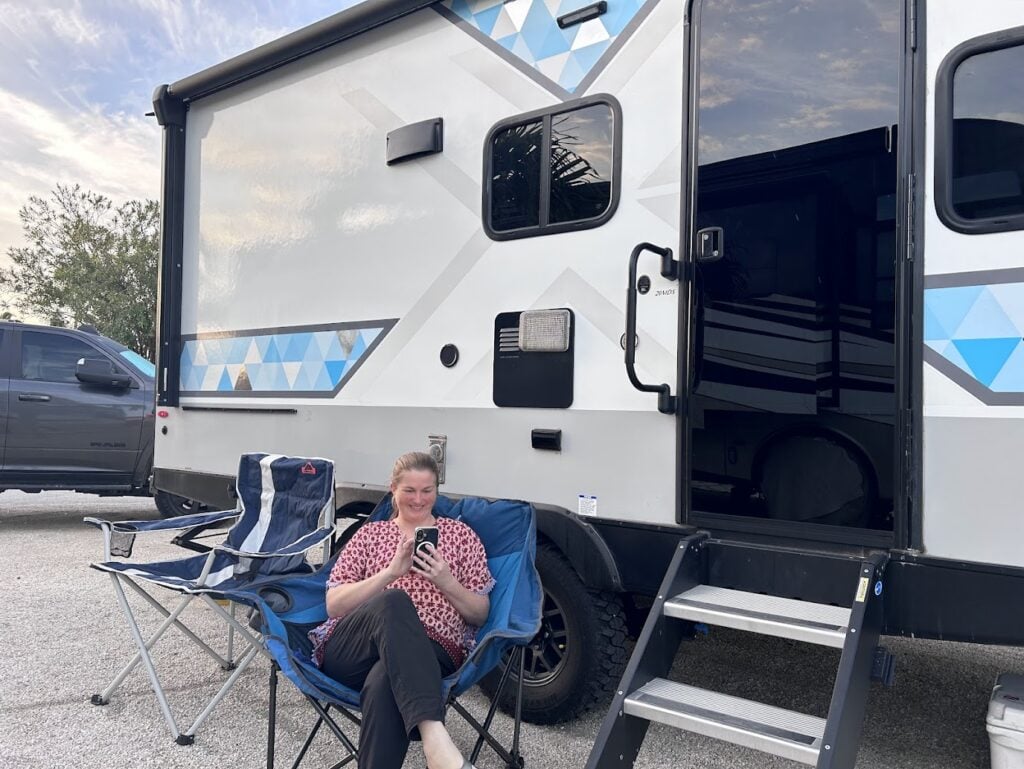
Many American cell phone companies will allow you to use your plan in Canada. Before RVing in Canada, call your cellular provider to confirm if your phone will work and if there are additional charges.
Our Verizon unlimited plans provide unlimited calls and texts at no additional charge. However, high-speed data is limited to 2 GB per day.
If having regular internet access is important, buy an international plan from your cellular provider or purchase a Starlink ROAM plan, which allows you to travel within North America.
Renting an RV in Canada
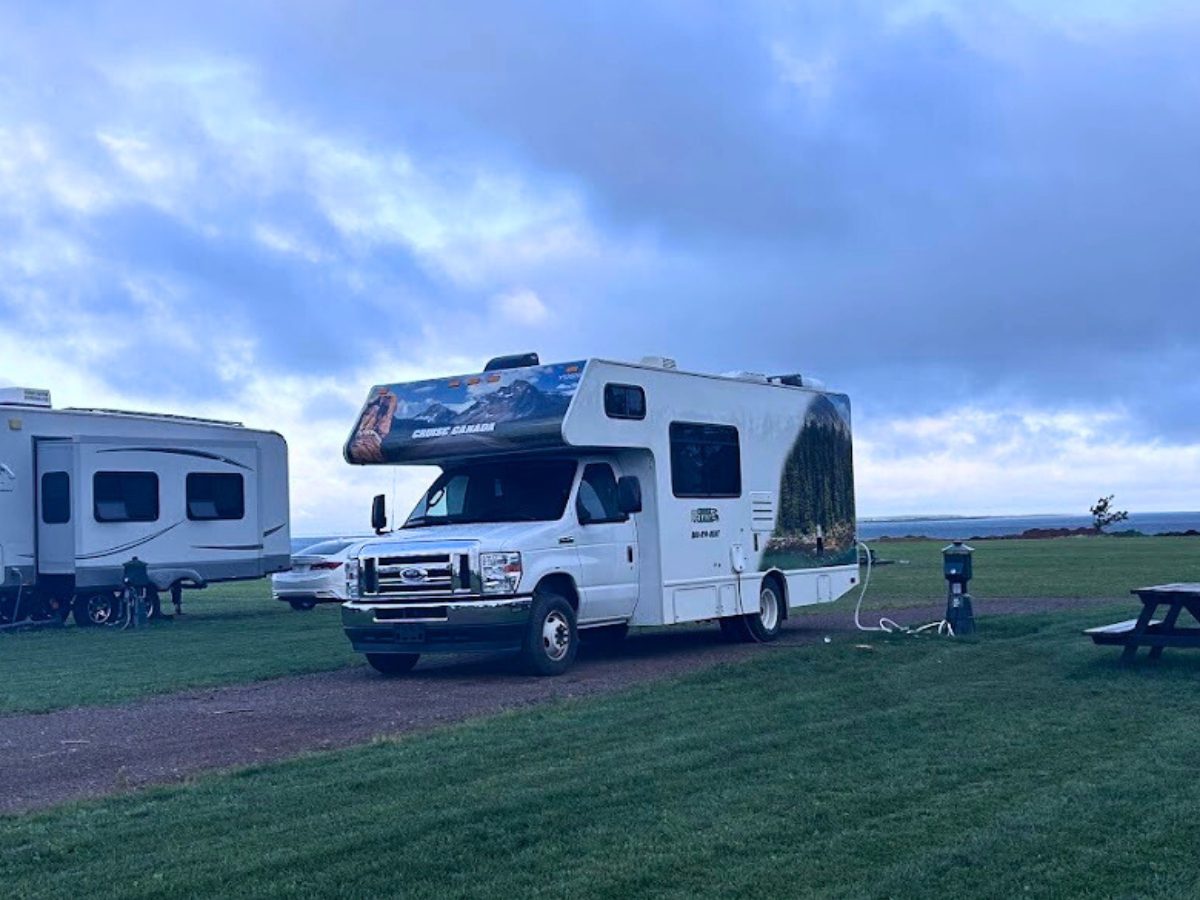
If you don’t own your own rig, there are several rental options for RVing in Canada. Cruise Canada offers truck camper and motor home rentals across the country. If you want a larger selection of RV types, RVezy is a marketplace that allows you to rent RVs from private owners.
RVing in Canada will be the experience of a lifetime. Traveling in an RV will allow you to see more of this beautiful country and meet locals along the way. If you are new to RVing, make sure you purchase all our recommended must have RV supplies before starting your trip.
Happy Camping
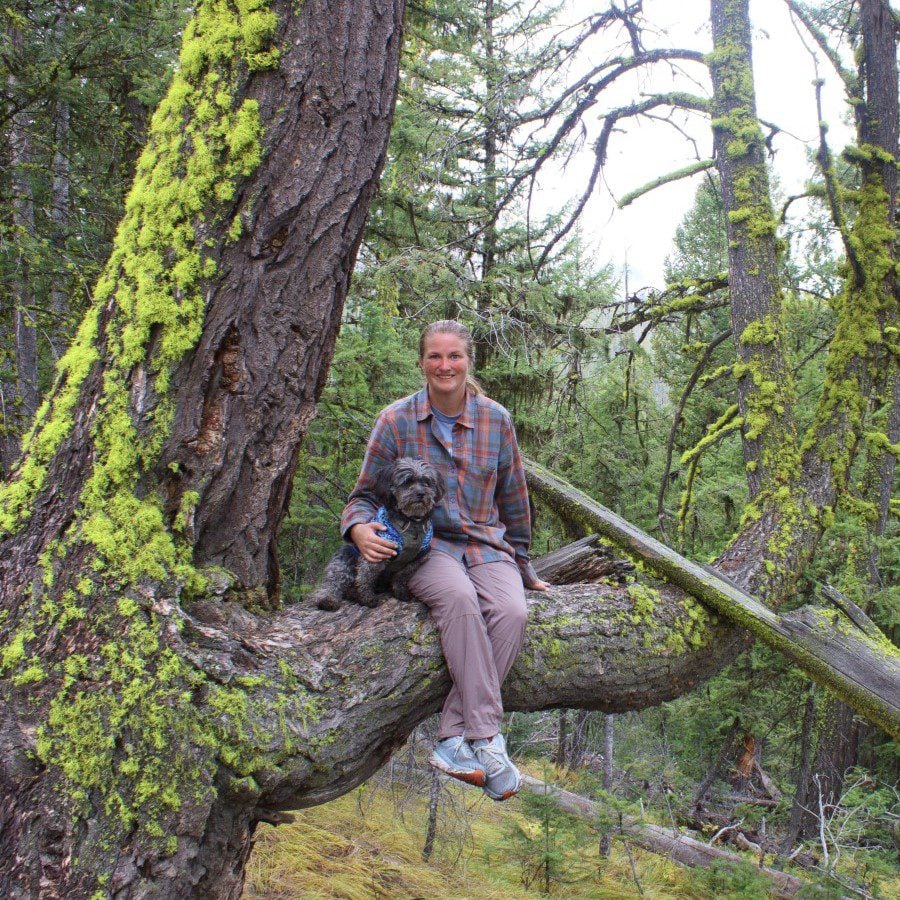
Christina Pate is a seasoned full-time RVer who, along with her husband Justin, has journeyed across the US, Canada, and Mexico. Drawing from her extensive travels, RV repairs and RV renovations, she founded Travels with Ted to guide and inspire fellow RV enthusiasts. Christina is also the co-author of The Owner’s Guide to RV Maintenance and the creator of My RV Log Book.

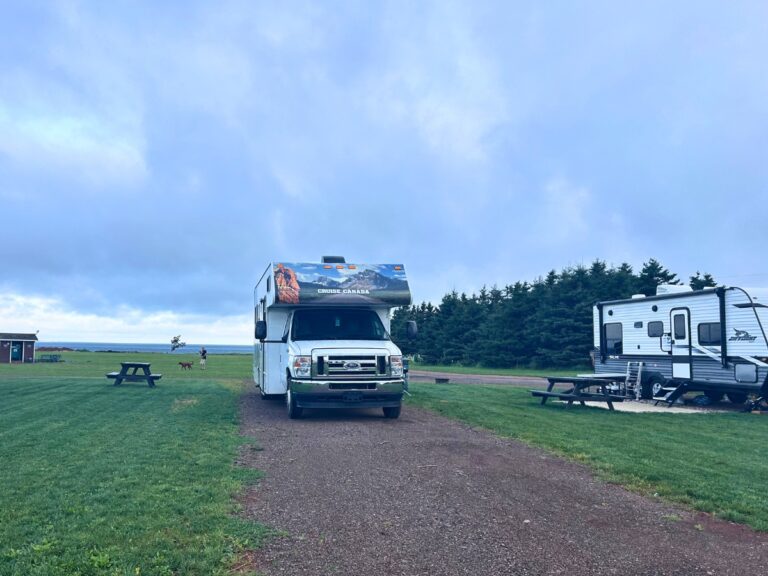
Thank you Christina. We are heading to Canada with our RV in September. Did they search your RV? We are prepared for that just wondering how the experience was if so. I’ve heard stories of them breaking things such as door handles since they work so differently in an RV.
They did not search us on the way into Canada. Crossing back into the U.S., they were looking in the fridges of all the RVs to check for banned produce. They let us open the slides and fridge for them, so there was no concern about them breaking anything.